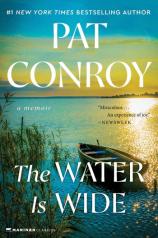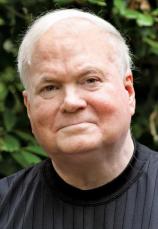Reading Group Guide
Discussion Questions
The Water Is Wide: A Memoir

1. THE WATER IS WIDE is set on Yamacraw Island in 1969, which is the fictionalized name for Daufuskie Island, just off South Carolina. In his first few weeks on the island, Conroy learns that his students aren’t just at a rudimentary reading level (“Seven of my students could not recite the alphabet. Three children could not spell their names…. Eighteen children did not know we were fighting a war in Southeast Asia”) and soon realizes this is going to be harder than he thought. He’s finally able to connect with the children through music. Why do you think music was an effective bridge to reach them?
2. Conroy seems complacent in describing his own casual racism in his youth. What led him to change his thinking and pursue a teaching job to Black youths on a remote island? What did Pete Seeger’s song “We Shall Overcome” have to do with it?
3. Looking back as he writes his memoir, Conroy realizes the earnestness with which he and his friends like Bernie approached teaching: “God, we were concerned about things: war, prejudice, injustice, education. Together we were insufferable, pontifical, self-righteous, voices of the Eucharist, pipelines to the Almighty. We could not be wrong because we were so young, humanistic, and full of sh--.” How were all of these qualities necessary to take on the job on Yamacraw?
4. Ted and Lou Stone are clearly racist. Why then would they choose to live on a small island, populated almost exclusively by Black people? How much has changed in race relations from 1969 to today? How far is left to go?
5. Conroy is adamant about showing the island kids a traditional American Halloween but is met with disaster at almost every turn. How might he have gone about this differently? Why was it so important to him to show his students life outside their island home?
6. Conroy and Mrs. Brown are as different as night and day when it comes to their teaching styles. How do they differ when it comes to disciplining the children? Conroy harbors the thought that Mrs. Brown “wishes she were white.” Do you agree? Why is she unpopular with the island parents?
7. The title “The Water Is Wide” comes from a British folk song. Why do you think Conroy chose it? Can you think of alternate titles that also could describe this memoir?
8. In an attempt to find a less violent means of disciplining his students, Conroy remembers a powerful practice from his childhood. Have you ever heard of “milking the rat” before? What is your opinion of it?
9. Of all the guests Conroy brings to the island, why do you think musician Richie Matta made the greatest impression on the students?
10. During his time on the island, Conroy is taken aback by how the kids, who are mostly sweet and kind in the classroom, mistreat their pets. Why do you think they have a different standard for their pets? Were you surprised by the pervasive gun violence in such a small island community?
11. After being fired by the board, the parents stage a boycott of the school and are threatened with jail time and fines. Conroy asks them to call it off: “I finally decided that the boycott was more of a prop for my deflated ego than something that was doing the island and my students any good. It was not worth the suffering etched in the faces of these parents who were trying so hard and succeeding at being brave.” Do you think this was the right decision? How did Conroy’s ego come into play before?
12. After his failed appeal, Conroy reflects on this turbulent year, realizing, “Teaching is a record of failures. But the glory of teaching is in the attempt.” Do you agree?
The Water Is Wide: A Memoir
- Publication Date: December 20, 2022
- Genres: Memoir, Nonfiction
- E-book: 320 pages
- Publisher: Mariner Books Classics
- ISBN-10: 0063322064
- ISBN-13: 9780063322066







